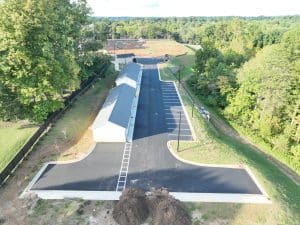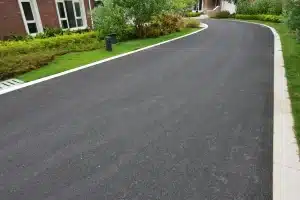Do you currently own a paved driveway that is beginning to age? Or perhaps you have recently acquired a new home or property with an asphalt paved drive and have noticed a few cracks forming. Regardless of how well your drive was paved cracks are inevitable. Here at Prime Paving & Sealcoating, we are driveway repair contractors, and we deal with this issue daily. Today we want to explain to you what happens when your driveway cracks.
Why is my asphalt cracking?
Don’t be alarmed when you notice cracks forming in your pavement because this naturally occurs over time. To better understand why your pavement cracks, you first need to know how asphalt is made.
Asphalt is a mixture of aggregate (finely crushed stone) and a binder that is created from crude oil which acts like a glue holding it all together.
This mixture is pre-heated in a machine before being laid down into a previously prepared roadbed and is very durable. That is why it is so commonly used as the primary material for paving across the United States.
Over time the binder that holds asphalt together naturally deteriorates and begins to break down. As the adhesive breaks down and dries out, it makes the pavement more susceptible to damage and cracking can occur.
Water is an Enemy
When pavement begins to age, it can be in danger of its arch-enemy water. Of every element out there, water is the most destructive force as far as asphalt is concerned.
For example, if you live in a climate that sees any type of snowfall and freezing temperatures throughout the year, water can wreak havoc. If there is any divot or small crack that has started to form from normal wear and tear water will settle into it. And if the temperatures drop and the water freezes it will expand when it develops into ice, thus making the crack grow wider.
The water beneath a roadbed, if it is failing, can also create a disaster for asphalt. If erosion is happening beneath the surface, depression will begin cracking soon after.
Roots and Plants
We have all driven on roads where massive trees have grown under an asphalt drive. What may have started as a small tree planted in hopes of becoming shade for an area can quickly develop into a more massive problem.
Some species of trees overgrow their root systems reaching out farther than their visible area in search of water and nutrients. It may take a little while to see the damage, but roots can push up a roadbed and destroy asphalt. If the damage is bad enough, a tree may need to be cut down, or the root system dug up and the road patched and repaired.
Furthermore, as the binder in asphalt dries out and subtle damage occurs from heavy vehicles holes within the surface of the pavement are perfect places for seeds to take root. The roots from everyday plants can take over and force their tendrils into the aging pavement and cause cracking as well.
How do I prevent and repair cracks in my driveway?
As we have said, earlier cracks are going to happen from exposure to the elements and natural age. However, there is something you can do to prevent some cracking.
Every three to five years, it is essential to reseal your driveway to replenish the binder that holds it together. Replenishing this binder will not only seal up any cracks that may have started to form, but it will also give your drive a visible facelift restoring its original black luster.
However, if you are seeing a deeper issue such as a hole that has developed from a crack, it can be patched and repaired. We do not recommend using a cold patch method that you can buy at a local hardware store though because it will not hold up over time. Plus, there could be other issues causing holes or cracks in your drive. That is why it is always imperative to hire a professional contractor such as Prime Paving & Sealcoating to inspect the issue.
If your driveway is reaching the age of 20 or more years, it is most likely time to redo your paving entirely as that is the average lifespan of asphalt.
Whatever your needs are when it comes to pavement or driveway repair or maintenance. Prime Paving & Sealcoating can fix it for you. We have been in business for over 60 years, and we have seen it all. If you have a question, don’t hesitate to call us today because we offer free estimates.





